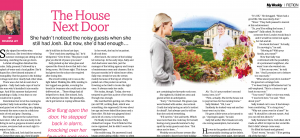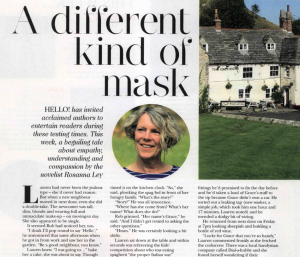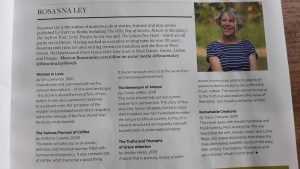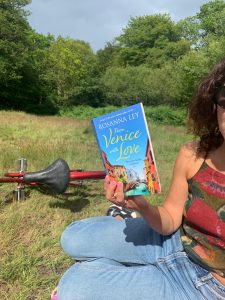Writing Cinematically
Listening to the radio the other day, I heard a presenter marvelling in an interview with a well-known film director and novelist at the fact that he referred to writing his novel in ‘scenes’. ‘You think like that because you’re a film director,’ he exclaimed.
Well, possibly. But I also think about my novel in scenes. And I’m definitely not a film director. This got me to thinking – why do I (and many other authors I’m sure…) think in scenes rather than just chapters?
Partly because a scene isn’t the same as a chapter. You could have two different scenes in one chapter or one scene running over two chapters.
And also – as authors, we’re imagining events taking place before we can begin writing them. This involves all the senses, including the visual. We’re imagining the whole scene, if you like.
When we’re plotting a storyline, we’re creating a sequence of events. But when we’re deciding on certain questions about a small section of the story: where is this taking place? When is it taking place? Who is there? What is happening and why? Then, we’re creating a ‘scene’. (Please note I am avoiding the obvious joke here…)
An example from my current novel, From Venice with Love… Early on in the story, someone finds some old family letters. What she reads, piques her curiosity and sets her off on a pathway of trying to find out more about the writer of these letters, a watercolourist named Emmy.
So… It’s Q & A time. Who finds the letters? Joanna. Where might she find them? In the attic. What is she doing there? Looking for some old childhood memorabilia. Why is she looking? To entertain her eccentric and difficult mother.
So now I’m getting to know the scene. Joanna will be in the attic looking for childhood memorabilia when she comes across some old and mysterious letters in an ancient and dusty trunk.
This is the scene. I know who is in it and I know where she is and what she’s doing. I can add some atmosphere and some thoughts and emotions. Hopefully I am also adding an element of mystery along the way and progressing the story too.
This all sounds rather obvious. But crucially, as writers, at least if we are planners, this is how we might plot out every section of our novel in order to form a tight structure.
I remember PD James once saying that she preferred to write cinematically, and that she would choose to write first whichever scene of her novel was most drawing her at the time, regardless of chronological order. This was because the emotions would be the strongest. She was already emotionally invested in the scene.
I’ve done the same. If you feel confident enough, chronology can always be sorted out later. Writing cinematically allows the writer to visualise a scene and all the elements within it so that the emotions and thoughts can be explored and the story naturally progresses. Within each scene, there are other elements of structure to consider of course. For example – whose viewpoint are you writing in? How will you create tension? What senses do you wish to describe in order to develop more layers of interest in the story? How will you manage the pace?
But basically, IMO it’s a great idea to get the scene in your head first.
Perhaps then, inside all of us novelists is a frustrated film director just waiting to get out..?
June News
Where has the time gone? It’s the last day of June and I just realised that not only did I miss posting here in May, but I also almost missed posting in June. I always have the same reason: I was immersed in a book – writing that is, not reading… In this case I was deep into the writing of my next book The Orange Grove which is to be published in 2021. But that’s not all…
So here’s a quick run-down of my June news:
 My new novel has been published in paperback! From Venice with Love hit the shops on 25th June and here it is with a delicious cocktail…
My new novel has been published in paperback! From Venice with Love hit the shops on 25th June and here it is with a delicious cocktail…
From Venice was also chosen for a Kindle promotion during June, which meant there was a lot of media work to do. There was so much support – it was wonderful and the book has done well in the Kindle charts.
 I wrote a few short stories for Hello, Woman & Home and My Weekly. Here’s a peek…
I wrote a few short stories for Hello, Woman & Home and My Weekly. Here’s a peek… 
Also, I’ve been writing some features about our writing holiday for Booktrail as you can read here: https://bit.ly/2ZtGzV8
And for My Weekly. I’ve done a feature for The Lady and interviews with some lovely BookBloggers such as Jill’s Book Café https://bit.ly/2BmaA1d. And the lovely Rebecca at https://bit.ly/2Byu6aL
I had a great chat with fab author Isabelle Broom whose latest book is called Hello Again. And here we are… https://bit.ly/38nGRAI
 I also chose my five favourite ‘lockdown reading’ books for Dorset magazine.
I also chose my five favourite ‘lockdown reading’ books for Dorset magazine.
I recorded two excerpts from From Venice for Booktrail and My Weekly on my balcony in the sunshine complete with birdsong… https://bit.ly/2BVv00W
So as you can see, I haven’t been twiddling my thumbs. See you in July!

Spring Reading (In Lockdown…)
So, here we all are – still in lockdown and looking for a way to escape into another world. No? Well, if not, I’d definitely recommend doing so, pronto.
Having said that, this year’s spring reading isn’t all happy stuff but it’s interesting – and there are plenty of different worlds on offer. Read on…
The Binding by Bridget Collins
This book caught my attention with its premis. Once upon a time, in the days after the Crusades when books were illicit and frowned upon (in this fictional world) there were people born to be ‘binders’ who could – with a person’s permission – ‘bind’ them by listening to and writing down their memories. Somehow, in this intuitive and slightly magical process, the person would ‘lose’ those memories; they would only be once again accessible if the book were to be destroyed. Books were kept by binders in safety vaults, but naturally, some would fall into the wrong hands and people’s secrets (that they no longer remembered) would be revealed. Some people considered binders a help to humanity since they allowed the bound person to forget their pain and suffering, some saw it as cowardly, others used the process to aid their own corruption. Novels were ‘fake’ since they were imagined rather than real memories…
It’s such a brilliant idea and I wish that the author had explored in more depth the theory that we grow as human beings through our pain and suffering; that without these experiences we may fail to develop our full potential; life’s rich tapestry and all that. The book is well-written though slightly laborious in the first half and slow to pull the reader in. However, about half way through, I was completely drawn into the love story, the strength of which overcomes the ‘binding’ of the two individuals concerned. It’s dark, atmospheric and truly mesmerising in places; a fascinating read.
On Chapel Sands by Laura Cumming
This haunting memoir has been described as being a love letter from the author to her mother and certainly it is her mother’s life – which includes a mystery, a kidnap, and the silence of her community – which Cumming explores. The author is also an art expert and she uses pictures (both paintings and photographs) to illustrate her points and to represent parts of the story. It is a story which weaves and rambles (but in a good way). I love the language and style with which she describes the area in which her mother grew up; her prose is vivid and compelling.
The downside of the memoir for me, is that its personal nature makes the story seem a bit self-indulgent at times. However, Cumming does often make her personal observations universal and the existence of ‘family secrets’ is a compelling idea for many of us. It is a slow story too but every time I wanted to put the book down, there was a little twist to keep me interested. Perhaps sometimes the use of the art world is a little overdone, and the story does become repetitious at times. Nevertheless, I was drawn into the emotions of this family and fascinated by the intimate portrait of a closed community that it presents. The story is thought-provoking and inspired a fascinating discussion about personal memories in our book group!
The Tattooist of Auschwitz by Heather Morris
I was inspired to read this book, having seen the high number of glowing reviews and by the fact that it has been a huge best-seller. I expected it to be a hard read and disturbing, because of the content, but I was prepared for this. Yes, it was disturbing, but I also found the story-telling somewhat distant and strangely emotion-less (given the traumatic content), because of the ‘reported’ nature of the narrative. Only when I came to the end of the book did I realise why. Yes, it is one man’s story of his time in Auschwitz, but it is his story as told (apparently) to the writer Heather Morris, who has then re-told his story from his perspective, but not fully in his perspective i.e. she has – for whatever reason – maintained an emotional distance; we are told of his emotions but not shown. It’s reported. The same applies when Morris moves into the viewpoint of Gita the girl Lale falls in love with in the camp. This means that the reader, while naturally horrified at the facts presented, might also not fully engage with the characters’ emotions.
I have also since read that the Auschwitz memorial society has questioned many of Morris’s ‘facts’ concerning this time at the camp and even that Lale’s son was upset by the fact that his name was wrongly written. His father’s name was actually Lali. I am left confused. Is this story intended to be Lali’s story or is it Lali’s story fictionalised? Is this made clear in the book and does it even matter? These are questions for every reader to answer for themselves. And who is profiting from this story of human misery? Are some of the profits from the sales of this book being given to war survivors or to the family – and if not, should they be?
Jackie and Maria by Gill Paul
I enjoy fiction that has been written around a real life story and this is a good example. Jackie Kennedy, whose husband Jack was famously assassinated in 1963 and who went on to marry the billionaire Aristotle Onassis, and Maria Callas, the famous opera singer who was his lover for many years, are both strong characters who have been in the spotlight of publicity and celebrity throughout their lives. The third character of this story, the link between the two women was Ari himself, and although Gill Paul does not write from his viewpoint, nevertheless as a character he still features in a larger than life way.
Their story is an eventful and emotional one. The author explains in her notes at the end of the book where she has taken dramatic license with the true historical facts and I think this is a good thing as it is tempting to believe every word of this captivating story and to forget that it is in fact a fictionalised version based on the truth as we know it.
These three are all charismatic characters with powerful personalities and all have a different way of dealing with the publicity they inevitably attract. I was fascinated to read about them and found their story played out against an intriguingly political and glamorous backdrop both dramatic and compelling.
The Dream Daughter by Diane Chamberlain
When Carly discovers that the baby she is carrying has a serious heart defect that will be fatal, she is naturally devastated. It is the 1970s, she has recently lost her husband to the Vietnam war and now it seems she will lose her baby too. But her enigmatic brother-in-law Hunter knows a way that Carly can save her daughter. All she has to do is make a huge leap of faith. Can she trust him and how can his plan possibly work?
This unusual story is packed with interesting characters, an unlikely premis and plenty of dramatic twists and turns which make the story both compelling and original. The structure of the novel is fascinating – it has been cleverly plotted; every small detail is there for a reason. Diane Chamberlain writes with great warmth and emotion while a fast pace keeps the reader gripped and the pages turning. Highly recommended.
A Single Thread by Tracy Chevalier
Tracy Chevalier excels at evoking the kind of fine detail that creates a strong sense of authenticity and realism in her books. And this is the perfect vehicle – a novel about the ‘broderers’ who make kneelers and tapestries at Winchester cathedral in the 1930s.
In particular, the novel features Violet Speedwell, one of the so called ‘surplus women’ surviving the losses of the first world war – Violet’s brother and fiancé were just two of the casualties. Her mother is embittered and domineering, whilst Violet just wants to get away and have the chance to lead a satisfying and independent life. This desire takes her from Southampton to Winchester where she becomes one of the famous ‘broderers’. She meets two women, Gilda and Dorothy, also searching for some acceptance outside social conventions and forms a potentially dangerous liaison with the older but charismatic Arthur, a bellringer, whose wife is still suffering from her wartime losses.
The novel shows us how difficult it was for women to find and sustain an independent life in this time. Independence comes at a cost – Violet may be pitied by her married female peers but she is judged by men, very few of whom understand how difficult it is merely to pay the rent. Men also pose a threat, especially to a woman who dares to stray outside the boundaries of those acceptable social norms.
This then is a book about loss. It is also the kind of book that embraces the reader and pulls them into Violet’s life and time. It is also about creativity – the descriptions of the embroidery and the bellringing are just wonderful. And it is about feminism too. I loved it. Highly recommended.
News
- Reading for the Rain
- Stormy Weather Reading
- Writing Beneath the Surface
- Summer Scorchers 2025
- The Feelgood Festival in Oslo
- Winter Hotties 2024/5
- Autumn Reading 2024
- Summer Reading 2024
- Finca Writing in March and June 2024
- My Spring Fiction 2024
- Themes and Schemes
- Top Winter Titles
- Autumn Leaves
- Summer Pages
- Spring Reading Delights
- Writing at the Finca in March
- Winter Chillers
- Autumn Pages
- Researching in Liguria
- Writing at the Finca in July
- Summer Sizzlers 2022
- Spring Reading 2022
- Flash Fiction Slam at BAC
- Writing at the Finca March 2022
- I Am Editing…
- It’s getting colder – time for some late Autumn goodies…
- Writing and Researching during a Pandemic
- Summer Sizzlers – my summer reading
- The Seville Orange and Almond Cake
- The Writing Walk
- Winter Reading Hotties
- Returning to Belle-ile-en-mer
- The Creation of a New World (to Everyone who Does It)
- Autumn Warmers
- Research in the Walled Gardens
- Late Summer Reading…
- Writing Cinematically
- June News
- Spring Reading (In Lockdown…)
- Returning to Mandalay
- Writing at the Finca in February
- Winter Reading
- Oranges in Seville
- Autumn Reading
- Portishead Visit
- An Italian Supper
- Spirit of Place
- Writing at Finca el Cerrillo – seven reasons for a group leader to host a Writing Holiday
- Summer Reading – 8 books to add to your summer tbr pile
- Self-Promotion – how ready are you to shout about it?